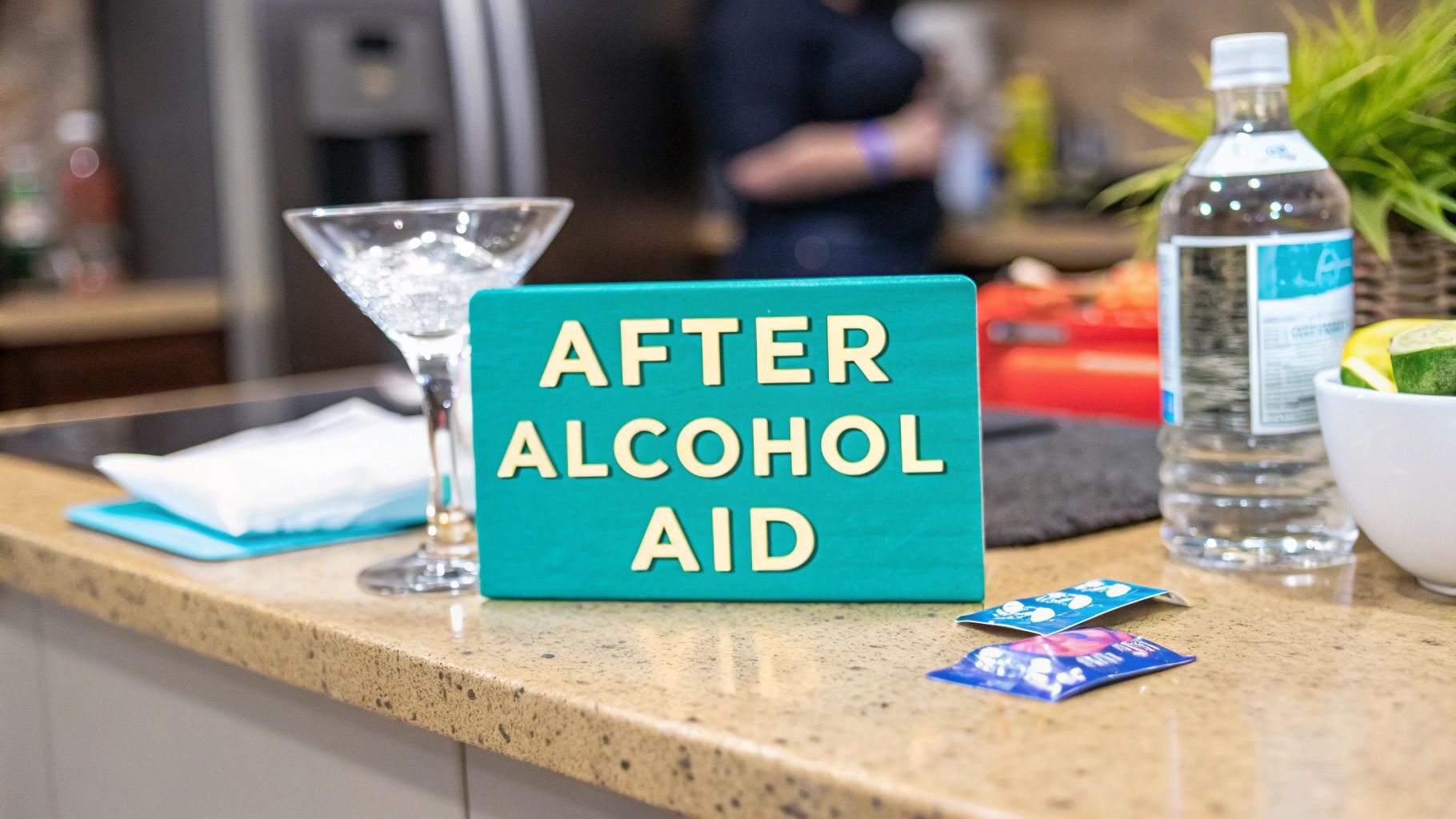

· By Annemarie
A Modern Guide to After Alcohol Aid
When it comes to after-alcohol aids, the most effective ones go way beyond just tackling a single symptom like dehydration. The real-deal solutions get to the heart of the matter by addressing the root causes: inflammation, toxic byproduct buildup, and nutrient depletion. Figuring out these core issues is the first step to finding relief that actually makes a difference.
What Happens When You Drink and Why You Feel So Awful
Ever woken up wondering why a few drinks left you feeling like you ran a marathon you don't even remember signing up for? It’s a messy biological domino effect.
Think of your body as a high-performance engine. Pouring alcohol into it is like filling the tank with cheap, sugary fuel. It forces every single system to work overtime, first to process it and then to clean up the chaos it leaves behind.
That morning-after misery isn't just one thing—it’s a multi-front war your body is fighting. The pounding head, queasy stomach, and can't-get-off-the-couch fatigue are just the surface-level signs of much deeper problems.
The Real Culprits Behind Your Hangover
While being dehydrated certainly doesn’t help, it's only a small piece of the puzzle. The main drivers behind that awful, can't-function feeling are way more complex and involve a few key biological meltdowns. A truly effective after-alcohol aid has to deal with all of these interconnected issues at once.
Here’s what’s really going on inside your body:
- Acetaldehyde Buildup: As your liver breaks down alcohol, it creates a nasty, toxic compound called acetaldehyde. This stuff is estimated to be 10 to 30 times more toxic than alcohol itself. It’s a major player behind symptoms like nausea and that lovely red-faced flush.
- Inflammatory Response: Your immune system basically sees alcohol as an invader and launches an inflammatory attack. This full-body response is what can lead to that general feeling of being unwell, trouble concentrating, and memory issues—that all-too-familiar "brain fog."
- Disrupted Sleep: Alcohol might knock you out fast, but the quality of sleep you get is terrible. It torpedoes your REM sleep, which is the most restorative stage for your brain and body. That’s exactly why you can "sleep" for eight hours and still wake up feeling like you’ve been hit by a truck.
Your body essentially treats a night of heavy drinking like an illness it has to fight off. The hangover you feel is just the aftermath of that internal battle, with inflammation and toxic byproducts as the main enemies.
Understanding these underlying causes is key. It makes it crystal clear why just chugging water or downing a coffee often feels like putting a band-aid on a bullet wound. For a deeper dive, you can learn more about what causes hangovers in our detailed guide. This is the foundational knowledge that explains why a modern, smart approach to after-alcohol aid targets these specific pathways to help your body bounce back.
Separating Myth from Reality in Hangover Remedies
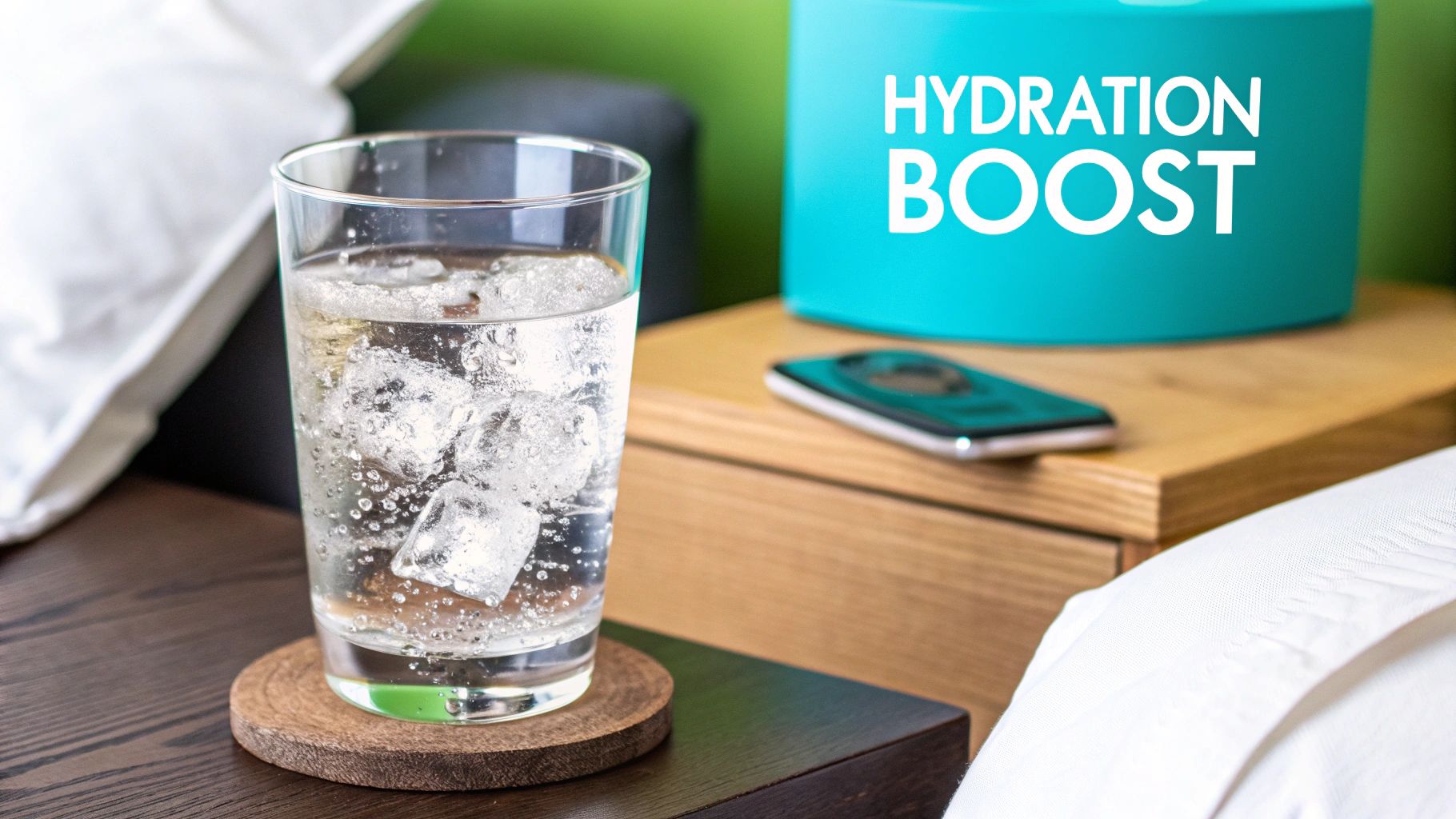
When that morning-after regret kicks in, we'll try just about anything to feel human again. Everyone has their go-to "cure," a piece of advice passed down from a friend of a friend. But if you actually look at the science behind these popular remedies, you'll find most of them are all smoke and mirrors.
From a greasy breakfast to the infamous "hair of the dog," these old wives' tales often give us more of a mental placebo than any real, physical relief. Knowing the difference is your first step toward finding an after alcohol aid that actually helps your body recover instead of just slapping a band-aid on the symptoms—or worse, making you feel even more terrible.
The Greasy Breakfast Fallacy
The image is classic: a plate of bacon, eggs, and hashbrowns to "soak up" last night's bad decisions. It sounds good in theory, but it’s based on a total misunderstanding of how your body handles alcohol.
By the time you wake up feeling the pain, that alcohol is long gone from your stomach. It's already been processed by your liver and is circulating in your bloodstream. A heavy, fatty meal at this stage won't absorb a thing. In fact, it's more likely to just annoy your already-unsettled stomach, making that nausea even worse. The only time food really helps is before you start drinking, because it slows down how quickly alcohol gets into your system in the first place.
Coffee: A Double-Edged Sword
It makes sense to reach for a strong cup of coffee. That jolt of caffeine can definitely help cut through the brain fog and fatigue. It's a stimulant, after all. It can even constrict blood vessels in your head, which might give you a temporary break from that pounding headache.
But here's the catch: coffee is also a diuretic. That means it makes you pee more, which is the last thing you need when you're already dehydrated. You'll be working against your own rehydration efforts, which are absolutely essential to feeling better.
A morning coffee might make you feel more awake, sure, but it's not fixing any of the real problems—like inflammation or the toxic gunk your body is trying to clear out. Think of it as a temporary patch, not a repair kit.
What About Hair of the Dog?
Ah, the "hair of the dog." The idea of having another drink to cure your hangover is probably the most stubborn myth of them all. And it's also the most counterproductive. Sure, a little more alcohol might temporarily dull the pain by giving your system something new to focus on, but you're just delaying the inevitable crash.
This "remedy" does absolutely nothing to help your body heal. All you're doing is prolonging the detoxification process and potentially feeding a really unhealthy cycle. A real after alcohol aid should support your body's recovery, not throw more of the problem at it. True recovery is about helping your liver, replenishing what you've lost, and getting back to 100%—not just kicking the can down the road.
The New Science of Morning Recovery
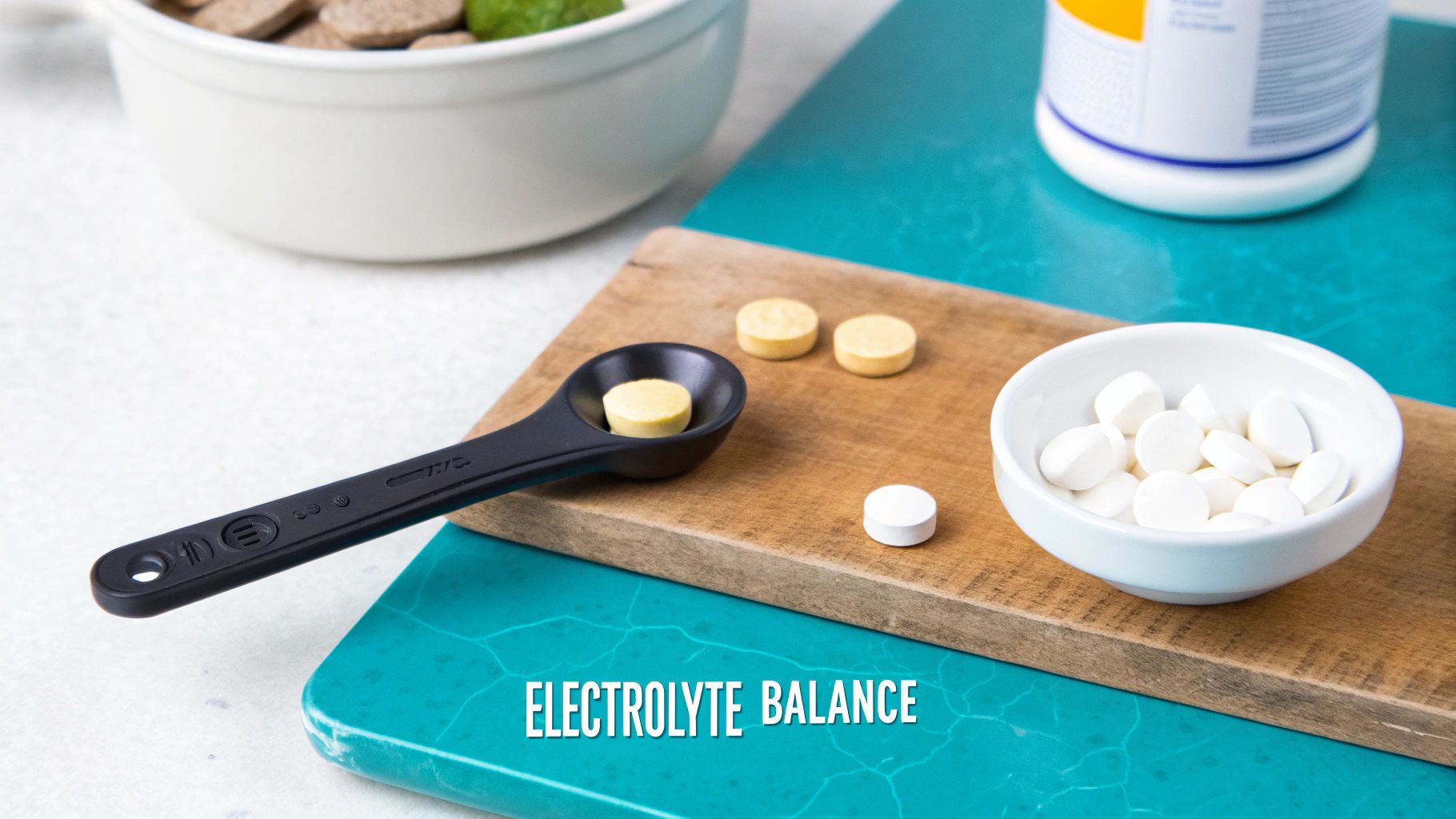
We've all heard the old-school advice for a rough morning: greasy food, hair of the dog, or just suffering in silence. But thankfully, we've moved past those folklore remedies. The modern approach to an after alcohol aid is built on something much more reliable: nutritional science.
Instead of just slapping a bandage on the symptoms, this new generation of recovery support focuses on giving your body the specific tools it needs to repair itself and get back on track. It's all about understanding the biological chaos alcohol kicks off and then delivering targeted, effective ingredients to fix each problem right at the source.
This means we have to go way beyond just chugging water. We're talking about tackling the deeper issues of nutrient depletion, oxidative stress, and the strain on your liver.
The Core Pillars of Modern Recovery
Look, there’s no single magic bullet for a rough morning. Real recovery comes from a strategic team of key nutrients working together to get your body back in balance. This science-backed approach targets the specific pathways alcohol disrupts, offering a much smarter way to bounce back.
Here are the key players:
- Powerful Electrolytes: Alcohol is a diuretic, which is just a fancy way of saying it makes you pee a lot. When you do, you're not just losing water; you're flushing out vital minerals. A modern aid replenishes crucial electrolytes like sodium and potassium that are essential for everything from nerve function to keeping your muscles from cramping.
- B Vitamins: Your body literally burns through its supply of B vitamins—especially B1, B6, and B12—as it works to process alcohol. Restoring these nutrients is critical for shaking off that crushing fatigue and clearing the mental fog that makes a bad morning so, well, bad.
- Antioxidants: When your body metabolizes alcohol, it creates a storm of nasty little molecules called free radicals. These cause oxidative stress and cellular damage all over. Potent antioxidants are like a cleanup crew, neutralizing these harmful compounds and calming the body-wide inflammation that makes you feel so awful.
Think of it like this: your body after a night out is like a construction site that just got hit by a storm. The new science of recovery doesn't just sweep up the debris; it delivers fresh lumber (B vitamins), fixes the wiring (electrolytes), and reinforces the entire structure (antioxidants) so you can rebuild faster and stronger.
Liver Support and Deep Hydration
Beyond these core pillars, the best recovery aids often include ingredients that provide even more specialized support. Compounds like milk thistle, for example, have been trusted for generations for their ability to help support and protect your liver while it's working overtime to clear everything out.
Ultimately, this scientific approach means you’re not just guessing anymore. You’re giving your body a complete nutritional toolkit designed to counter the specific havoc alcohol creates. And while plain water is always a good start, understanding the best way to rehydrate after drinking with proven science tips shows why combining it with electrolytes and other nutrients is a much more effective game plan.
How Upside's Formula Supports Alcohol Recovery
A truly effective after-alcohol aid isn’t about one single, magic ingredient. It’s about a whole team of them working together. Think of it like a pit crew for your body—each component has a specific, science-backed job to do to get you back in the race. That’s exactly how we designed Upside’s formula: as a complete system to support your body's natural recovery process.
Instead of just slapping a band-aid on your symptoms, this approach gets to the heart of the matter—tackling that toxic buildup, inflammation, and cellular stress head-on. It’s a smart, strategic combination that works with your body, not against it.
The Power Trio of Ingredients
The magic behind Upside is really the synergy between our key ingredients. Each one takes on a different aspect of alcohol's effects, giving you comprehensive support right when you need it most.
Here’s a look at how they work together:
- Dihydromyricetin (DHM): Think of DHM as a bouncer for your brain. It helps reduce alcohol's effects on your GABA receptors, which is a big part of why you feel so foggy and sluggish the next day. It also gives your liver a hand in processing alcohol more efficiently.
- L-Cysteine: This amino acid is your first line of defense against acetaldehyde, that nasty, toxic byproduct responsible for most of that morning-after misery. L-Cysteine helps your body produce glutathione, a powerhouse antioxidant that neutralizes acetaldehyde and kicks it out of your system faster.
- Prickly Pear Extract: Known for its potent anti-inflammatory properties, Prickly Pear helps calm down the immune response that alcohol triggers. This is huge for dialing down the body-wide inflammation that fuels headaches and that general feeling of being unwell.
The real strength here is how they all work in concert. DHM speeds up the breakdown process, L-Cysteine helps neutralize the toxic aftermath, and Prickly Pear manages the inflammatory fallout. It’s a fully coordinated defense system for your body.
Now, let's take a closer look at what each of these key players brings to the table.
Upside's Key Ingredients for Recovery
| Ingredient | Primary Function | How It Helps After Alcohol |
|---|---|---|
| Dihydromyricetin (DHM) | Liver Support & Brain Clarity | Helps your liver break down alcohol and its byproducts faster while also minimizing alcohol's impact on your brain's GABA receptors. |
| L-Cysteine | Detoxification Support | Acts as a precursor to glutathione, one of the body’s most powerful antioxidants, which helps neutralize the toxic acetaldehyde. |
| Prickly Pear Extract | Anti-Inflammatory | Calms the body's inflammatory response to alcohol, which can help reduce the severity of headaches and body aches. |
This combination isn't just a random mix; it's a carefully selected team designed to address the problem from multiple angles for a more complete recovery.
Designed for Rapid Absorption and Convenience
Having the right ingredients is only half the battle. If your body can't absorb them quickly, they can't do their job. Upside’s easy-to-take format ensures these key compounds get into your system fast, so they can get to work right away. It's a whole lot better than swallowing a handful of different pills and just hoping for the best.
We believe in being totally transparent about what you're putting in your body. To see the full list and get into the science behind every choice we made, you can explore our full ingredient breakdown. You’ll see exactly how each element contributes to a smarter, smoother morning.
This chart gives you a good visual of how a supported recovery system helps stabilize your body and reduce symptoms over 24 hours.
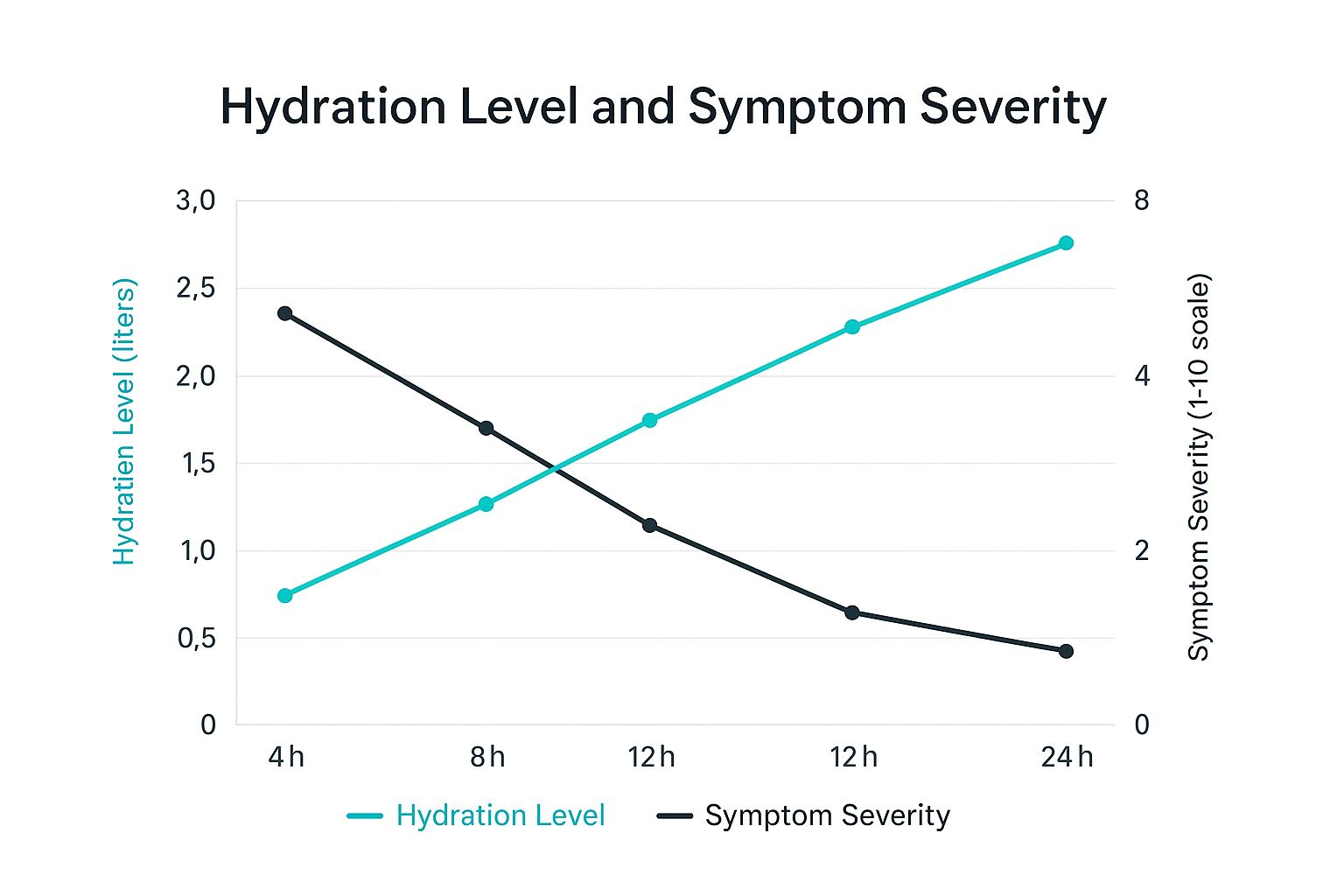
As you can see, by getting to the root causes, you can manage symptoms more effectively and restore hydration, which ultimately leads to a much smoother recovery curve.
How to Drink Smarter and Prevent Hangovers
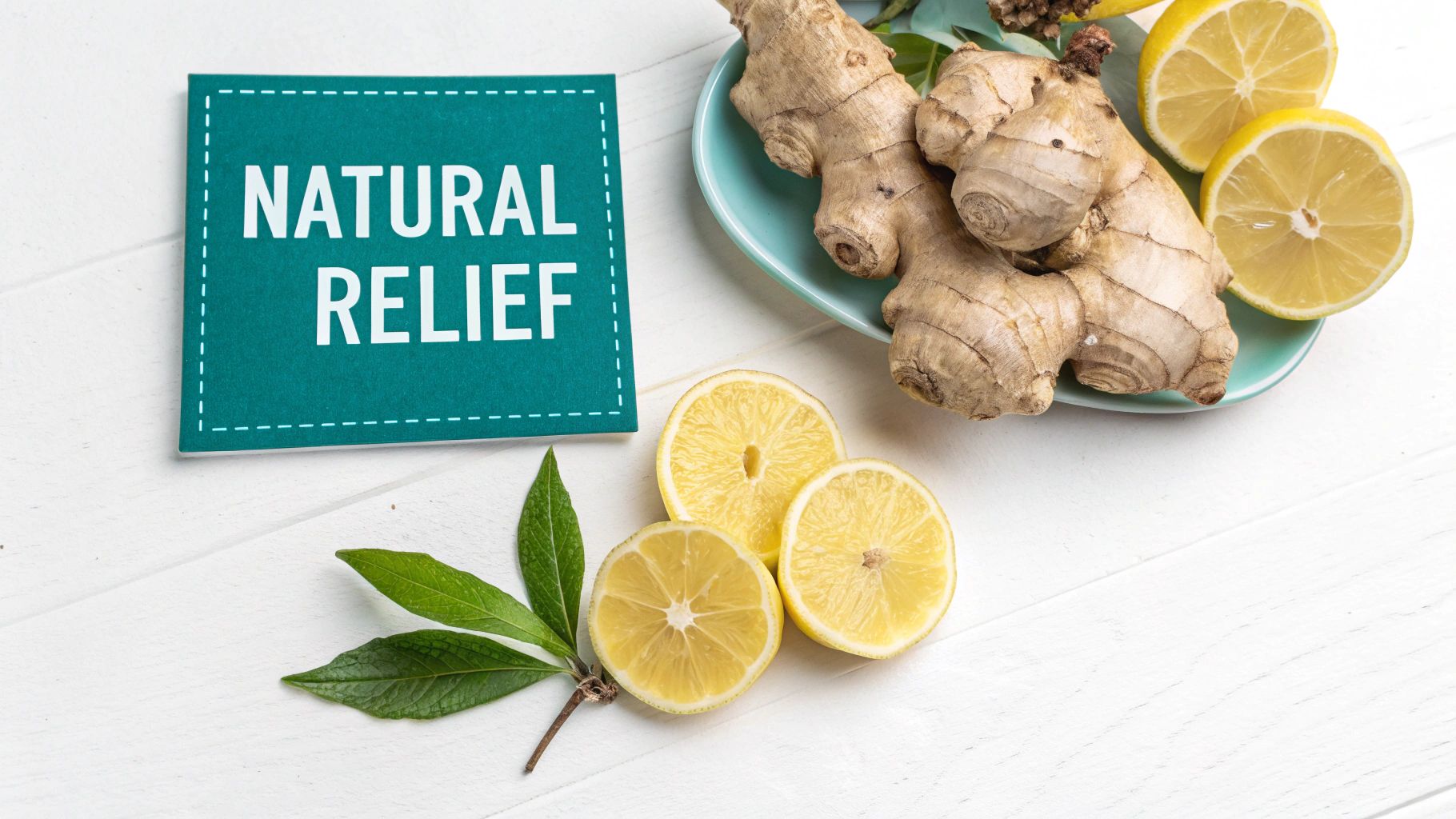
While a good after-alcohol aid can feel like a lifesaver, the best move is always a proactive one. Let's be real: preventing the damage before it even starts is way easier than trying to undo it the next morning. A few smart, simple tweaks to your routine can make a world of difference in how you feel.
Think of it like getting ready for a big workout. You wouldn't just roll out of bed and immediately start sprinting without stretching or hydrating first, right? The same logic applies here. Prepping your body for a night out is the key to a much smoother next day.
Set Your Foundation Before the First Drink
What you do hours before your first sip is just as important as what you do during the night. The absolute most critical step? Eat a solid, balanced meal. Food in your stomach—especially meals with protein, healthy fats, and complex carbs—slows down how quickly alcohol gets absorbed into your bloodstream.
An empty stomach is basically an express lane for alcohol, letting it hit your system all at once and totally overwhelming your liver. A good meal acts like a speed bump, creating a much more manageable pace for your body to handle.
Strategic Choices Throughout the Night
Once you're out, a couple of mindful habits can seriously cut down on the next-day misery. This isn't about limiting your fun, but just being a little smarter with your choices. It’s all about working with your body, not against it.
Here are a few practical tips to keep in mind:
- Hydrate Relentlessly: This one's simple but effective. For every alcoholic drink you have, down a full glass of water. It’s a game-changer for counteracting the dehydrating effects of alcohol and keeping your system in balance.
- Choose Lighter Alcohols: Darker liquors like whiskey, brandy, and even red wine are loaded with congeners. These are chemical byproducts known to make hangover symptoms way worse. Sticking to clear spirits like vodka, gin, or light rum can help you dodge a lot of that extra pain.
Of course, the most foolproof method is just moderation. It's a serious topic—alcohol consumption contributed to 2.6 million deaths worldwide in 2019 alone from various diseases and injuries. You can read more about the global impact of alcohol from the World Health Organization if you're interested. Making smarter choices doesn't just save you from a rough morning, it's a huge plus for your long-term health.
Your Guide to Responsible Drinking and Wellness
Let's be real: a great after alcohol aid is a fantastic tool to have in your back pocket. But it's only one piece of a much larger puzzle. Feeling your best isn't about finding a magic eraser for a big night out. It's about building a lifestyle that makes you more resilient from the get-go, so your body is better equipped to handle a social drink in the first place.
Think of it like tending a garden. If the soil is rich with nutrients, well-watered, and clear of weeds, it can bounce back from the occasional storm. But if that same garden is already stressed out and depleted, even a little rain can do some damage. Your body works the same way when it comes to alcohol.
Building Your Body's Resilience
The habits you keep every day lay the foundation for how you feel, and that includes how you bounce back after a few drinks. Things like chronic stress, a less-than-ideal diet, and not getting enough sleep put your body in a constant state of defense, leaving fewer resources to deal with the extra work of processing alcohol.
When you make your overall health a priority, you're essentially pre-loading your body with the strength it needs to roll with the punches.
- Prioritize Sleep: Getting consistent, quality sleep is absolutely non-negotiable. When you’re well-rested, your liver works more efficiently and your immune system stays balanced, which makes for a much smoother recovery process.
- Manage Daily Stress: High cortisol levels from day-to-day stress can make inflammation worse. Weaving things like a daily walk, yoga, or meditation into your routine can help keep that stress response from going into overdrive.
- Focus on Nutrition: A diet packed with vitamins, minerals, and antioxidants gives your body the raw materials it needs to thrive. It means you have a solid reserve of nutrients before a drink ever touches your lips.
A Mindful Approach to Drinking
Products like Upside are designed to be powerful allies, but they work best as part of a responsible, mindful approach to social drinking. They’re here to support your body’s natural processes, not to fight an uphill battle against a system that’s already running on empty.
An after alcohol aid should be a supportive tool, not a free pass. It shifts your mindset from just "fixing a problem" to actually "supporting your wellness" on a journey that includes enjoying life's social moments.
This big-picture view is all about long-term wellness. Listening to your body, knowing your limits, and making conscious choices are the real cornerstones of a balanced life. By taking care of yourself day-in and day-out, you're setting yourself up to handle the occasional celebration with grace, ensuring a good time doesn't throw your health goals off track.
Common Questions About After Alcohol Aid
Even with all the science out there, a ton of questions and myths still float around about hangovers and how to bounce back. Let’s cut through the noise and get straight to the practical answers for what people really want to know about an effective after alcohol aid.
Can You Actually Cure a Hangover?
The short answer? Nope. There’s no magic pill that will instantly delete every symptom. A real "cure" would have to reverse all of alcohol's effects on your body in a matter of minutes, and that’s just not how biology works.
But that doesn’t mean you’re out of options. A high-quality after alcohol aid can give your body a massive boost in its natural recovery process. Think of it less as a cure and more as a highly effective support system. It works by delivering the specific nutrients your body is screaming for to fight inflammation, neutralize toxic gunk like acetaldehyde, and rehydrate you from the inside out.
How Quickly Do These Aids Start Working?
This really depends on your own body and the format of the product you’re taking. Aids designed for fast absorption, like gels or liquids, can start getting key ingredients into your system within 30 to 60 minutes.
You’ll probably start to notice the first wave of benefits—like the brain fog lifting or your stomach settling down—within the first couple of hours. From there, the full effects, like getting your energy back and ditching those body aches, continue to build as your body uses the ingredients to get back in balance.
Key Takeaway: You can't just snap your fingers and fix a hangover. But you can give your body a powerful toolkit to speed up the repair job, seriously cutting down how long and how miserable you feel.
Is It Safe to Mix Recovery Aids with Painkillers?
This is a big one. Generally, it's a bad idea to mix over-the-counter painkillers with alcohol still in your system, especially anything with acetaminophen (like Tylenol). Your liver is already working overtime to process the alcohol, and throwing those meds into the mix can put it under some seriously dangerous stress.
Always, always check the ingredients list and talk to a doctor if you’re unsure. Most science-backed recovery aids are designed to work with your body, not against it. They focus on giving you nutritional support, not just masking symptoms with medication.
Ready to face your mornings with confidence? Upside offers a science-backed, convenient jelly stick packed with the ingredients your body needs to bounce back faster. Give Upside a try and feel the difference for yourself.
